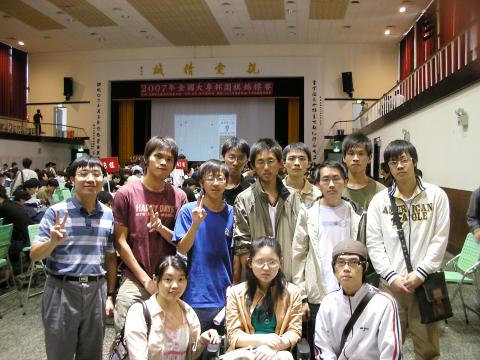Taiwan’s Aja Huang (黃士傑) is one of the key developers behind AlphaGo, the artificial intelligence (AI) program developed by Google’s DeepMind unit that on Thursday secured a second win against go world champion Lee Sedol in Seoul.
Huang, who obtained sixth-dan ranking as an amateur go player in 2007, sat opposite Lee during the first two matches, placing the counters on behalf of AlphaGo.
Professor Lin Shun-hsi (林順喜) at National Taiwan Normal University (NTNU) said Huang completed his doctorate in computer engineering inside five years, but extended the course by two years to develop software known as “Erica.”

Photo courtesy of National Taiwan Normal University professor Lin Shun-hsi
Huang chose go as his primary subject the moment he enrolled in the program, Lin said, adding that his initial programs lost against low-level go players.
The culmination of nearly a decade of effort was the software Erica, which defeated the then-champion program “Zen” and won a gold at the Computer Olympiad.
Huang was also the founding member of the go club at NTNU, Lin said.
Huang was in constant contact with many first-rate programmers abroad and he used that to his advantage, Lin said, adding that Huang could often be found making video calls to the experts to discuss crucial programming techniques if he was having problems.
Huang obtained a job as a research assistant in Canada and went on to work at English company DeepMind in 2012, Lin said, adding that Huang and David Silver were the head programmers at the company.
Lin said he is happy that Huang never gave up his explorations of AI programming for the game go.
“Huang is living proof that NTNU should not just be known as a university that produces educators,” Lin said.
The next match between Lee and AlphaGo is scheduled for today, with a total of five matches to be played by Tuesday next week. The winner is to receive a prize of US$1 million (NT$32,95 million).
Lee, a South Korean who holds 18 world titles, said he was “speechless” after losing a match for a second consecutive day on Thursday.
Lee said AlphaGo played a near-perfect game on Thursday and admitted that he did not feel he was leading at any point during the game.
AlphaGo generated widespread attention when an article published in the journal Nature explained how DeepMind had succeeded in producing an AI program that had mastered go and had achieved a 99.8 percent success rate against other AI programs.
Additional reporting by CNA

Taiwanese can file complaints with the Tourism Administration to report travel agencies if their activities caused termination of a person’s citizenship, Mainland Affairs Council Minister Chiu Chui-cheng (邱垂正) said yesterday, after a podcaster highlighted a case in which a person’s citizenship was canceled for receiving a single-use Chinese passport to enter Russia. The council is aware of incidents in which people who signed up through Chinese travel agencies for tours of Russia were told they could obtain Russian visas and fast-track border clearance, Chiu told reporters on the sidelines of an event in Taipei. However, the travel agencies actually applied

New measures aimed at making Taiwan more attractive to foreign professionals came into effect this month, the National Development Council said yesterday. Among the changes, international students at Taiwanese universities would be able to work in Taiwan without a work permit in the two years after they graduate, explainer materials provided by the council said. In addition, foreign nationals who graduated from one of the world’s top 200 universities within the past five years can also apply for a two-year open work permit. Previously, those graduates would have needed to apply for a work permit using point-based criteria or have a Taiwanese company

The Shilin District Prosecutors’ Office yesterday indicted two Taiwanese and issued a wanted notice for Pete Liu (劉作虎), founder of Shenzhen-based smartphone manufacturer OnePlus Technology Co (萬普拉斯科技), for allegedly contravening the Act Governing Relations Between the People of the Taiwan Area and the Mainland Area (臺灣地區與大陸地區人民關係條例) by poaching 70 engineers in Taiwan. Liu allegedly traveled to Taiwan at the end of 2014 and met with a Taiwanese man surnamed Lin (林) to discuss establishing a mobile software research and development (R&D) team in Taiwan, prosecutors said. Without approval from the government, Lin, following Liu’s instructions, recruited more than 70 software

Chinese spouse and influencer Guan Guan’s (關關) residency permit has been revoked for repeatedly posting pro-China videos that threaten national security, the National Immigration Agency confirmed today. Guan Guan has said many controversial statements in her videos posted to Douyin (抖音), including “the red flag will soon be painted all over Taiwan” and “Taiwan is an inseparable part of China,” and expressing hope for expedited reunification. The agency last year received multiple reports alleging that Guan Guan had advocated for armed reunification. After verifying the reports, the agency last month issued a notice requiring her to appear and explain her actions. Guan